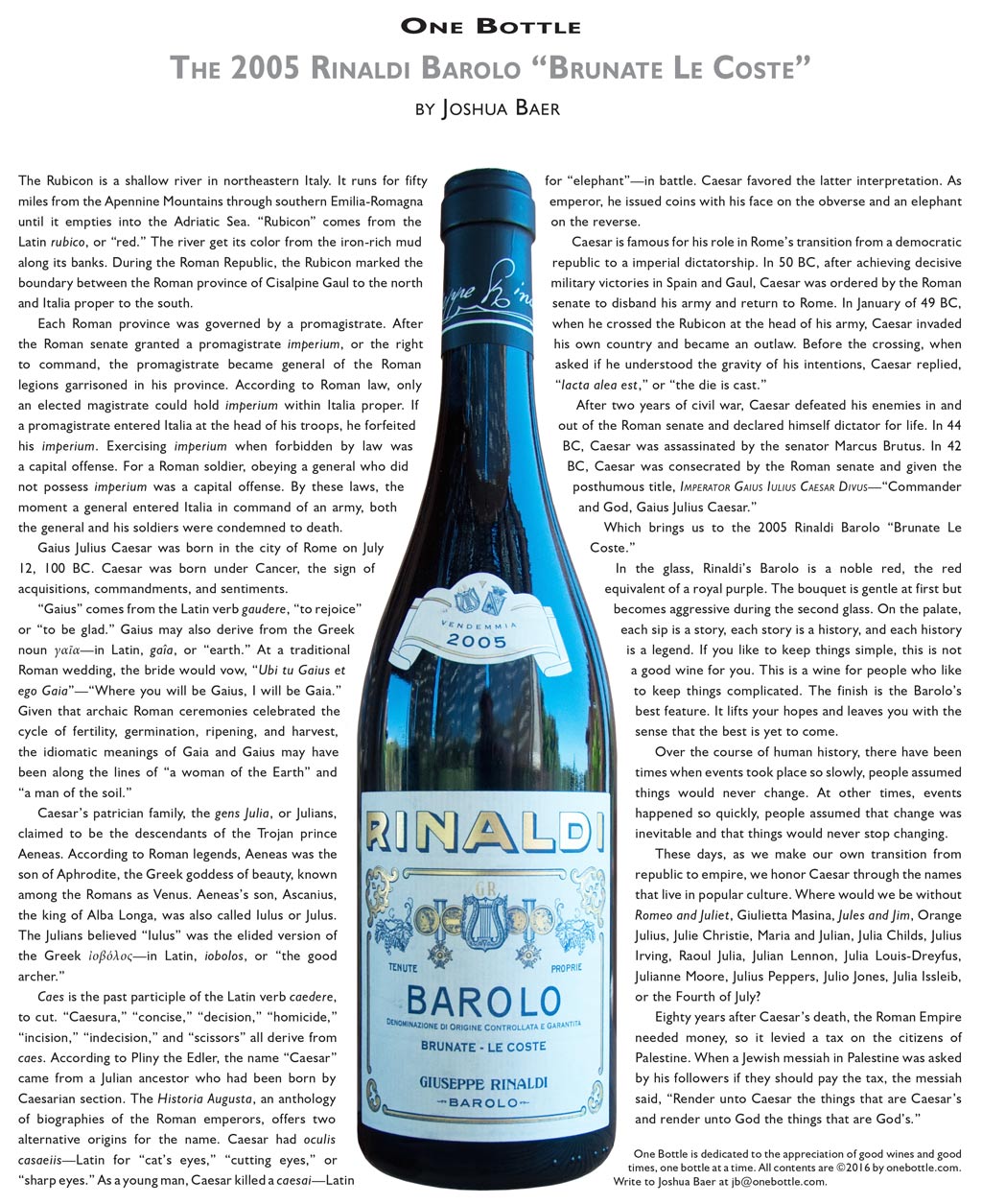2005 Rinaldi Barolo “Brunate Le Coste”
The Rubicon is a shallow river in northeastern Italy. It runs for fifty miles from the Apennine Mountains through southern Emilia-Romagna until it empties into the Adriatic Sea. “Rubicon” comes from the Latin rubico, or “red.” The river get its color from the iron-rich mud along its banks. During the Roman Republic, the Rubicon marked the boundary between the Roman province of Cisalpine Gaul to the north and Italia proper to the south.
Each Roman province was governed by a promagistrate. After the Roman senate granted a promagistrate imperium, or the right to command, the promagistrate became general of the Roman legions garrisoned in his province. According to Roman law, only an elected magistrate could hold imperium within Italia proper. If a promagistrate entered Italia at the head of his troops, he forfeited his imperium. Exercising imperium when forbidden by law was a capital offense. For a Roman soldier, obeying a general who did not possess imperium was a capital offense. By these laws, the moment a general entered Italia in command of an army, both the general and his soldiers were condemned to death.
Gaius Julius Caesar was born in the city of Rome on July 12, 100 BC. Caesar was born under Cancer, the sign of acquisitions, commandments, and sentiments.
“Gaius” comes from the Latin verb gaudere, “to rejoice” or “to be glad.” Gaius may also derive from the Greek noun γαῖα—in Latin, gaîa, or “earth.” At a traditional Roman wedding, the bride would vow, “Ubi tu Gaius et ego Gaia”—“Where you will be Gaius, I will be Gaia.” Given that archaic Roman ceremonies celebrated the cycle of fertility, germination, ripening, and harvest, the idiomatic meanings of Gaia and Gaius may have been along the lines of “a woman of the Earth” and “a man of the soil.”
Caesar’s patrician family, the gens Julia, or Julians, claimed to be the descendants of the Trojan prince Aeneas. According to Roman legends, Aeneas was the son of Aphrodite, the Greek goddess of beauty, known among the Romans as Venus. Aeneas’s son, Ascanius, the king of Alba Longa, was also called Iulus or Julus. The Julians believed “Iulus” was the elided version of the Greek ἰοβόλος—in Latin, iobolos, or “the good archer.”
Caes is the past participle of the Latin verb caedere, to cut. “Caesura,” “concise,” “decision,” “homicide,” “incision,” “indecision,” and “scissors” all derive from caes. According to Pliny the Edler, the name “Caesar” came from a Julian ancestor who had been born by Caesarian section. The Historia Augusta, an anthology of biographies of the Roman emperors, offers two alternative origins for the name. Caesar had oculis casaeiis—Latin for “cat’s eyes,” “cutting eyes,” or “sharp eyes.” As a young man, Caesar killed a caesai—Latin for “elephant”—in battle. Caesar favored the latter interpretation. As emperor, he issued coins with his face on the obverse and an elephant on the reverse.
Caesar is famous for his role in Rome’s transition from a democratic republic to a imperial dictatorship. In 50 BC, after achieving decisive military victories in Spain and Gaul, Caesar was ordered by the Roman senate to disband his army and return to Rome. In January of 49 BC, when he crossed the Rubicon at the head of his army, Caesar invaded his own country and became an outlaw. Before the crossing, when asked if he understood the gravity of his intentions, Caesar replied, “Iacta alea est,” or “the die is cast.”
After two years of civil war, Caesar defeated his enemies in and out of the Roman senate and declared himself dictator for life. In 44 BC, Caesar was assassinated by the senator Marcus Brutus. In 42 BC, Caesar was consecrated by the Roman senate and given the posthumous title, Imperator Gaius Iulius Caesar Divus—“Commander and God, Gaius Julius Caesar.”
Which brings us to the 2005 Rinaldi Barolo “Brunate Le Coste.”
In the glass, Rinaldi’s Barolo is a noble red, the red equivalent of a royal purple. The bouquet is gentle at first but becomes aggressive during the second glass. On the palate, each sip is a story, each story is a history, and each history is a legend. If you like to keep things simple, this is not a good wine for you. This is a wine for people who like to keep things complicated. The finish is the Barolo’s best feature. It lifts your hopes and leaves you with the sense that the best is yet to come.
Over the course of human history, there have been times when events took place so slowly, people assumed things would never change. At other times, events happened so quickly, people assumed that change was inevitable and that things would never stop changing.
These days, as we make our own transition from republic to empire, we honor Caesar through the names that live in popular culture. Where would we be without Romeo and Juliet, Giulietta Masina, Jules and Jim, Orange Julius, Julie Christie, Maria and Julian, Julia Childs, Julius Irving, Raoul Julia, Julian Lennon, Julia Louis-Dreyfus, Julianne Moore, Julius Peppers, Julio Jones, Julia Issleib, or the Fourth of July?
Eighty years after Caesar’s death, the Roman Empire needed money, so it levied a tax on the citizens of Palestine. When a Jewish messiah in Palestine was asked by his followers if they should pay the tax, the messiah said, “Render unto Caesar the things that are Caesar’s and render unto God the things that are God’s.”
One Bottle is dedicated to the appreciation of good wines and good times, one bottle at a time. You can write to Joshua Baer at jb@onebottle.com.
